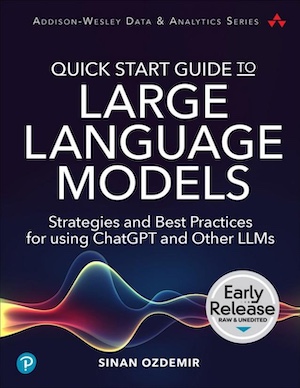
|
FreeComputerBooks.com
Links to Free Computer, Mathematics, Technical Books all over the World
|
|
- Title: Quick Start Guide to Large Language Models: Early Release
- Author(s) Sinan Ozdemir
- Publisher: Addison-Wesley (2024); eBook (Early Release, Internet Archive Edition)
- Paperback: 384 pages
- eBook: PDF
- Language: English
- ISBN-10: 0135346568
- ISBN-13: 978-0135346563
- Share This:

|
The Practical, Step-by-Step Guide to Using Large Language Models (LLM) at Scale in Projects and Products. Clears away those obstacles and provides a guide to working with, integrating, and deploying LLMs to solve practical problems.
About the Authors- Sinan Ozdemir is currently the founder and CTO of LoopGenius and an advisor to several AI companies.
- Machine Learning
- Natural Language Processing (NLP)
- Computational Linguistics
- Information Retrieval (IR) and Search Engines Design/Implementation

- Quick Start Guide to Large Language Models: Early Release (Sinan Ozdemir)
- The Mirror Site (1) - PDF (2nd Edition)
-
 Foundation Models for Natural Language Processing
Foundation Models for Natural Language Processing
This open access book provides a comprehensive overview of the state of the art in research and applications of Foundation Models and is intended for readers familiar with basic Natural Language Processing (NLP) concepts.
-
 Foundations of Large Language Models (Tong Xiao, et al.)
Foundations of Large Language Models (Tong Xiao, et al.)
This is a book about Large Language Models (LLMs). It primarily focuses on foundational concepts rather than comprehensive coverage of all cutting-edge technologies: pre-training, generative models, prompting techniques, and alignment methods.
-
 Large Language Models in Cybersecurity: Threats and Mitigation
Large Language Models in Cybersecurity: Threats and Mitigation
This open access book provides cybersecurity practitioners with the knowledge needed to understand the risks of the increased availability of powerful Large Language Models (LLMs) and how they can be mitigated.
-
 Understanding Large Language Models (Jenny Kunz)
Understanding Large Language Models (Jenny Kunz)
This practical book offers clear, example-rich explanations of how Large Language Models (LLMs) work, how you can interact with them, and how to integrate LLMs into your own applications.
-
 Speech and Language Processing (Dan Jurafsky, et al)
Speech and Language Processing (Dan Jurafsky, et al)
This text takes an empirical approach to the subject, based on applying statistical and other machine-learning algorithms to large corporations. It describes a unified vision of speech and language processing. Emphasis is on practical and scientific applications.
-
 How to Scale Your Model: A Systems View of LLMs on TPUs
How to Scale Your Model: A Systems View of LLMs on TPUs
This book takes a very practical, systems-oriented approach to explain the performance side of LLMs like how Tensor Processing Units (TPUs) (and GPUs) work under the hood, how these devices communicate, and how LLMs actually run on real hardware.
-
 Representation Learning for Natural Language Processing
Representation Learning for Natural Language Processing
This book provides an overview of the recent advances in representation learning theory, algorithms, and applications for natural language processing (NLP), ranging from word embeddings to pre-trained language models.
-
 Linguistics for the Age of AI (Marjorie McShane, et al)
Linguistics for the Age of AI (Marjorie McShane, et al)
This book summarizes an exciting approach to knowledge-rich natural language understanding, in the context of language - using AI agents. Anyone interested in building cognitive systems that use language should read this book.
-
 Computational Linguistics: Models, Resources, Applications
Computational Linguistics: Models, Resources, Applications
This comprehensive reference work provides an overview of the concepts, methodologies, and applications in computational linguistics and natural language processing (NLP). It will be of interest and practical use to a wide range of linguists.





